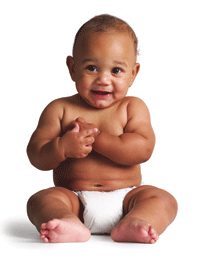Sound off: Decoding baby noises
A babbling baby may be one of the most wonderful […]

Your baby’s sounds will fill your heart with delight and stress you out beyond belief—and a lot of the time, they’ll just plain confuse you. Is your baby crying because he’s hungry? Does he want his diaper changed? Does he just sincerely believe that you are the worst mother in the history of the world? What does he want?
That’s the million-dollar question, and there are no clear-cut answers. The truth is, you’ll figure it out. In a few months, you’ll be able to tell a bored cry from an angry cry from a sick cry without even thinking about it—a feat which we know seems impossible when you’re going face-to-face with your disgruntled offspring. That’s why we’ve put together this handy little code breaker to help you make it through those first few crazy months when all you want to know is what the heck your baby wants.
The Cries
All cries are not created equal. And believe it or not, you can distinguish one from another. These are some of the common cry triggers—and a couple of tips on what you can do to cure them.
The Sad Cry
The sad cry is usually a kind of whimper that escalates into a very pitiful wail. It can be a result of any number of things—boredom, discomfort, another cry cue that went unnoticed. Of course the fix here is figuring out what’s making your little one sad and turning it around. In my experience, it’s often cured with a little attention—try entertaining him with a stuffed animal, introducing a game of peek-a-boo, or singing a song to him.
The Mad Cry
Some kids don’t get sad—they get mad. The triggers of the mad cry are typically the same as those of the sad cry —it’s largely the personality of the child that decides how they will react. My daughter was a sad crier; my son an extremely assertive mad crier. (And interestingly, which cry they opt for says a good bit about their personality. My daughter is still likely to cry quietly if someone hurts her feelings, while my mad-crying son is more apt to hit or scream at the offender, much to my frequent embarrassment.) So the same soothing tips apply: Give your baby a little attention for a few minutes and help him calm down.
The Sick Cry
The sick cry is so, so sad. It’s often a weak, almost nasally wail that might be accompanied by other sick symptoms, such as a change in behavior or poor appetite. It typically isn’t a very aggressive cry, almost as though the poor little thing can’t even muster the energy to put up a good fight. Call the doctor! You can check your baby’s temperature before you dial since your doctor will probably ask about that, but get on the phone—a little medical advice is going to be the quickest way to help you and your baby feel better.
The Hungry Cry
A hungry baby almost sounds as though he’s begging for some food, with a cry that rises and falls rhythmically. (Unattended, the hungry cry is likely to turn into the sad or mad cry.) Before the hunger cry there are usually some signs that it’s coming, like your baby trying to snack on his own hands or rooting around for something to latch onto. The easiest way to tell if you’re dealing with the hungry cry is to look at the clock—if it’s near your baby’s regular feeding time, a little snack may be the answer. The clock trick isn’t infallible, though, since growth spurts are common in babies and can cause an increase in feedings for a period of time.
The Hurt Cry
A high-pitched, sudden shriek is probably the result of pain. (Most babies let you know what this one sounds like when they get a shot.) It’s typically much louder than a regular cry. You might also notice your baby having to catch her breath between wails. Obviously you need to figure out what’s causing such pain and make it better! [tip:] Always check for random pins and tags, especially in fancy baby duds, since they can cause babies extreme discomfort. Summertime bug bites can also cause hurt-cry worthy discomfort, so be sure to check your baby for bites after an outdoor adventure.
The Tired Cry
The cry of a tired baby is, in my opinion, the beginnings of what will later become whining. Sometimes a baby will also cry this way if she is uncomfortable or bored. You’ll recognize the whiny, nasally moan and can figure out what it means based on what it’s accompanied by—rubbing eyes? Probably tired. Been in the swing for 30 minutes? Back might be sore—time for a position swap. Mobile stopped spinning? Need a change of scenery or another wind-up. Eventually, most moms learn to mostly tune out the tired cry until it morphs into the mad cry—it’s usually not an urgent transmission.
The Happy Sounds
With all those tears, it’s good to know that babies make happy sounds, too. Sometimes it seems like there’s one happy sound for every 100 sobfests, but that’s pretty normal. I think this is largely because happy babies tend to simply be quiet—a little one who is lying quietly looking around is really enjoying himself (and learning at the same time, which is always important.) But here are a few of the sounds that will make your days unbelievably brighter.
The Happy Squeal
The squeal is most often brought on by someone else providing entertainment, such as gentle tickles or raspberries on baby’s tummy. (And when you score a squeal, you will feel like such a rock star.) Babies will sometimes squeal while hanging out by themselves in their bouncy seat, though, too, which is so funny and touching. I can guarantee that you will stop whatever you’re doing and go smile at your baby.
The Baby Babble
All those undistinguishable words will be recognizable soon enough—for now just enjoy the music that is your baby making absolutely no sense at all and having a ball talking to herself. It’s so cute. Try repeating the sounds that she makes back to her if you’re talking together—it’s a good way to teach her that she can also repeat what you say, when she’s ready.
The Funny Laugh
It’ll probably be a little bit before your baby starts laughing, but it’s one of the most hilarious and exciting things that you’ll ever hear. Whatever it was that brought on the laugh, you’ll keep repeating it for days in hopes of another funny cackle.







